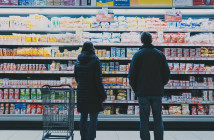Inflation is hovering at a 40-year high, driven by steep increases in food prices, housing and utilities.
The Federal Reserve is trying to bring it down by aggressively raising interest rates, even if it pushes the economy closer to a recession.
Still, prices are soaring, making it harder for many Americans to get by.
The concept of inflation has been around for decades, as prices have always fluctuated over time. While it is easy to see and measure those price changes, it is something else to actually understand them.
Inflation can impact many things besides costs, such as employment and wages.
So, what is inflation, and what causes it?
What is inflation?
Inflation is a “generalized rise in prices,” said Josh Bivens, the director of research at the Economic Policy Institute. For example, goods like gas, rent or food can be impacted by inflation.
“Inflation, though, really is meant to only refer to all goods and services, together, rising in price by some common amount,” he explained.
What causes inflation?
Inflation can be caused by several factors. The most common is “a macroeconomic excess of spending over the economy’s relative ability to produce goods and services,” Bivens said.
In this instance, more people are spending on goods or services that are not readily available to meet those demands, so producers begin to raise prices.
“If everyone in the economy, tomorrow, decided they weren’t going to save any money from their paychecks, and they’re just going to spend every last dollar out of the blue, they would all run to the stores and try to buy things,” Bivens said. “But, producers haven’t produced enough to accommodate that big surge of across-the-board spending. So, you would see prices bid up.”
Another cause of inflation is a lack of producers. If there are not enough workers to produce the demanded good or service, this would lead to an increase in prices as well, Bivens said.
“Labor is the primary component of cost of producing anything,” he explained.
There is also a level of “built-in inflation” within economies, where systems try to get inflation to revolve around a steady percent.
In the U.S., the Federal Reserve System’s target inflation is 2%. This means businesses can increase prices by 2% each year, and the market will still be competitive. Workers can also ask for a 2% wage raise based on these increases, so they can still afford goods and services.
“That 2% is kind of the built-in inflation; what everyone expects to happen,” Bivens said. “So, what everybody is able to adjust without a lot of pushback from other sectors.”
Is inflation good or bad?
Inflation is both good and bad, Bivens said.
“The inflation we have today (in 2022) is just bad. It’s too high. It’s too fast,” he said. But consistent and positive, yet low rates of inflation can be beneficial, he added.
“Inflation is sort of greasing the wheels of the labor market,” Bivens said. “It is a way to do some adjustments without actually having to cut nominal wages, and the economy just seems to operate better like that.”
If inflation goes beyond its target percentage, it can cause uncertainty within the market.
“Whatever your target is, you don’t want to go really far above that. You want people to be able to make plans and have a predictable sense of how much prices and wages will rise over the next year,” Bivens said. “That’s why inflation, well in excess of the target, is clearly a bad thing.”
Who is hurt by inflation?
It is hard to determine exactly who is hurt most by inflation, in a generalized sense. However, whoever is spending most on the goods or services can be negatively impacted by inflation.
For instance, when gas or food prices are inflated, low and moderate income families are hurt since they spend a higher share of total income on energy and food, said Bivens.
“Any specific inflation tends to be sparked and driven by a particular set of goods and services,” he said. “For that, who has a really high share of those, and they’re spending, that’s who’s going to be hurt.”
Will inflation cause a recession?
Inflation and recession are strongly related, said Bivens, but the two economic concepts are not completely mutually exclusive.
“A big rise in the unemployment rate is going to put a lot of downward pressure on inflation,” he said. “As the economy slows, inflationary pressures tend to relent.”
A recession isn’t determined by a negative quarter of gross domestic product or even two for that matter. Rather, it’s a significant decline in economic activity resulting from several factors, including high unemployment, a slowdown of goods produced and sold, and wages falling in addition to negative GDP readings.
That’s according to the National Bureau of Economic Research, which gives the official ruling on when a U.S. recession starts and ends.
So, inflation could produce a recession, but it is not a definite outcome.



